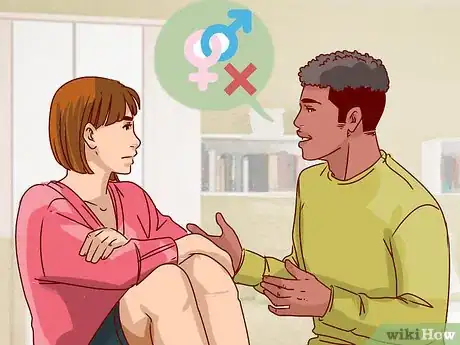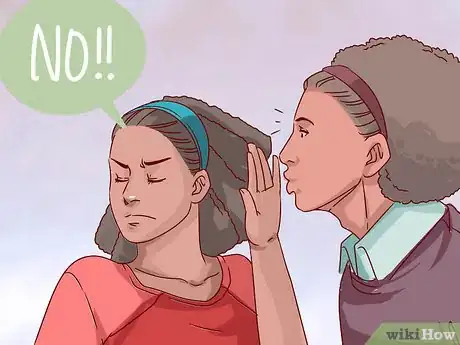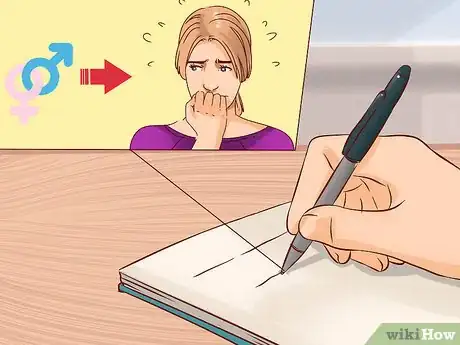This article was co-authored by Josh Spurlock, MA, LPC, CST. Josh Spurlock is a Licensed Professional Counselor and the Founder and CEO of MyCounselor.Online. With more than 15 years of experience, he specializes in marriage counseling, family counseling, and sex therapy through a Christian counseling lens. Josh holds a Bachelor’s Degree in Biblical Languages, Literatures, and Linguistics and a Master’s in Counseling Psychology from Evangel University.
There are 9 references cited in this article, which can be found at the bottom of the page.
This article has been viewed 58,353 times.
Sex should be a pleasurable experience between consenting people and you should never have sex when you don’t want to. Unfortunately, sometimes you may feel pressured to have sex by your spouse, your partner, or even your friends or a stranger. With clear communication, an understanding of your feelings about sex, and strategies to handle it when the pressure goes too far, you can successfully deal with being pressured to have sex.
Steps
Dealing with Pressure in the Moment
-
1Be firm and direct. The best way to deal with being pressured to have sex is to tell the person to stop in a clear, direct way, whether it’s a stranger or someone you know. Doing this makes it plain that you don’t want to have sex and want them to quit pressuring you right now.
- Avoid phrases like, “I don’t know about this” or “Maybe we shouldn’t”. Your meaning can be misinterpreted.
- You might say, "When I say no, I mean it. Don't keep asking me or trying to change my mind. If or when I am willing, I'll let you know.
- With a spouse or partner you could try, "When you ask me to have sex so often, I feel pressured and uncomfortable. Please stop."
- If they keep pushing, keep saying ‘no’. This is called the "broken record" technique. The person can't continue pressing without looking like an enormous jerk.
-
2Say ‘no’ with your body language. Sometimes your words can say one thing, but your body language says something different. Communicate that you want them to stop pressuring you to have sex by using your tone of voice, posture, and other non-verbal cues.[1] Telling them and making sure your actions match your words will make your message clear.
- Stand up (or sit up) straight and tall. Hold your head up and relax your shoulders. This posture will increase your confidence.
- If you need to, take a step or two back to put some physical space between you and the person.
- Look the person in the eyes. Without smiling, speak using a clear, calm, firm voice.
-
3Leave the situation. In some cases, even when you firmly say ‘no’ with your words and actions, the person doesn’t stop pressuring you. In these cases, deal with the pressure by leaving the situation as quickly as you can.[2] Leaving, even if only for a minute or two, can lower the intensity of the moment and give the other person a chance to think rationally about what they’re doing.
- Excuse yourself to the bathroom or to get a bottle of water. If you go back to the situation, keep some physical distance between you and the person.
- Lying isn’t usually recommended. However, if it is the only way for you to get away from someone that won’t stop pressuring you for sex, then lie.
- You might glance at your phone and then say, “I have to go. My mom just texted me to come home.”
Communicating How You Feel
-
1Be clear about what you want. Although you should never feel pressured into having sex, if you sometimes play hard to get when you want sex, then your partner may think you're playing hard to get when you truly mean no. Being clear about what you want, through your words and body language, can eliminate the pressure to have sex.
- Make sure your actions match your words. Saying ‘stop’ while you continue to kiss the person back sends mixed signals about what you want to do.
- If you want to have sex, be clear about it. If you're not sure if you want to have sex or definitely don’t want to do it then be clear about that, too.
- Talk about it beforehand to make sure that you are both on the same page. For example, if you enjoy playing hard to get, talk to your partner and set up a safe word to use when you really don’t want sex.
-
2Have a mature conversation. Talking with your significant other or friends is a direct way to handle their pressure.[3] Explain your feelings and what any issues are. Speak honestly and really listen to what they have to say about it. Having this conversation could clear up any miscommunication and help both of you deal with sex.
- Try to have the conversation in a place that is private, quiet, and where you won't likely be interrupted. Put your electronic devices on vibrate or turn them off.
- Don’t just talk. Also, listen to what the other person is trying to tell you. Let them explain why they are pressuring you and how they feel about the situation.
- Ask questions to make sure you understand what they are saying and what they mean. For instance, you might say, “So, you’re saying my actions make you think that I want to have sex?”
- You may want to come to an agreement for what you do when your partner wants their needs met and you aren't in the mood and vice versa. It helps to be clear about your expectations as well as theirs.
-
3Explain your reasons. You don’t have to give a reason (especially to a stranger). However, if your significant other is the one pressuring you for sex, it will help if you explain to them why you don’t want to have sex. You're letting your partner know why you made this choice and why it's important to you.[4]
- You could tell a friend, "I honestly don't feel that I'm ready for sex at this point in my life” or "My religion is important to me. I want to wait until marriage."
- If it’s your spouse or partner, and you normally have a sexual relationship with them, you might try, “I’m not feeling very sexual because of all the stress I have.”
- You don’t have to keep explaining yourself over and over, though. Once you’ve explained it, the person should respect you and stop pressuring you.
- If your friend or dating partner doesn’t respect who you are and what your values are, it’s time to reconsider your relationship with them.
- Definitely consider giving at least a brief explanation to a partner you care about; if you don’t they might feel confused and rejected.
Understanding How You Feel About Sex
-
1Boost your self-esteem. It will be much easier for you to deal with pressure to have sex if you feel good about yourself. You will be less likely to think things that aren’t true like that having sex will make you seem cooler or that it will make your spouse love you more.
- Look in the mirror and tell yourself, “Whether I have sex or not, I am an attractive, cool person.”
- Make a list of all the good things about you that don’t involve sex. For example, you might write that you are caring, good-looking, and athletic.
- Do things and spend time with people that make you feel good about yourself.
-
2Know how you feel about sex. Understanding what your personal beliefs and feelings are about sex with help you deal with it when someone pressures you to have sex.[5] It will also help when you are explaining to someone why you don’t want to have sex.
- Make a journal entry about what sex means to you. Describe what feelings you think should go with it and when you think it’s okay to have sex.
- Make an honest list of reasons you don’t want to have sex (right now). For example, don’t write ‘I’m too busy’ if the real reason is that you aren’t comfortable with your body right now.
- If you’ve been shamed and ridiculed by others in the past, you might be avoiding sex solely to avoiding potential rejection.
- Write about how your beliefs and background have influenced how you feel about sex.
- For example, your religious or spiritual beliefs might affect how you view sex.
-
3Know your boundaries. Think about what you are okay with doing sexually and where you draw the line. Knowing your boundaries is important for dealing with being pressured to have sex. When you are clear in your mind what your limits are, you can communicate it to others. This will get rid of any confusion or misunderstandings.[6]
- Make a list of sexual and intimate situations and put a check (or smiley face) beside those you are okay with doing.
- For example, you might be okay with kissing, hugging, and cuddling, but not want to do anything past that.
- You could tell your partner, “I like it when we hug and cuddle. I want to keep doing that. But I’m not ready to move past that.”
Getting Help When It Goes Too Far
-
1Expose sexual harassment. If you have already told someone you don’t want to have sex and they continue to bother you, especially if it is someone you don’t know very well like a co-worker, it may be sexual harassment.[7] You should deal with this by telling the person to stop. You should tell someone of authority like your coach or boss.
- If the person is continually making sexual comments that make you feel uncomfortable and you have told them to stop, it can be considered harassment.
- You could say to the person, “What you are doing is uncomfortable and is sexual harassment. You need to stop.”
- If possible, avoid the person or leave the area when they come around. You shouldn’t change your life for this person, but you can deal with them by limiting your contact.
- Say to your teacher or boss, “I need to talk to you about someone that is bothering me. I think it is sexual harassment.”
-
2Report sexual assault. You should report it if someone has pressured you into having sex or doing something sexual when you didn’t want to. Whether it is a stranger, your spouse, or anyone else, you always have the right to say ‘no’ and to have your wishes respected. If someone pressured you into something sexual, then deal with it by telling someone.[8]
- Even if you had sex with the person before, if you say ‘no’ this time, the person should stop. Just because you said ‘yes’ once, doesn’t mean you always want to have sex.
- Immediately tell someone you trust what has happened. If you are nervous or afraid about reporting it, then ask them to be with you when you report it.
- Try to report it to the authorities as soon as possible. It will be easier for the authorities to investigate and handle.
- Talk to a professional like a crisis or trauma counselor. They can help you deal with your feelings about what happened and move on past it.
-
3Tell someone about sexual abuse. When someone pressures you into sex more than once, it can be considered sexual abuse whether you are a child, teenager, or adult. If someone has repeatedly made you have sex when you didn’t want to, deal with it by telling someone you trust.[9]
- Don’t blame yourself and don’t try to keep what is happening a secret.
- The best way to deal with it and get it to stop is by telling someone you trust what is going on. They can help you make it stop.
- Go see a therapist or counselor to help you cope with the abuse and learn how to recover from it.
Expert Q&A
-
QuestionMy best friend's brothers want me to give them oral sex and I'm not comfortable with doing that, and every time they see me they always ask me to do it. What do I do?
 Paul Chernyak, LPCPaul Chernyak is a Licensed Professional Counselor in Chicago. He graduated from the American School of Professional Psychology in 2011.
Paul Chernyak, LPCPaul Chernyak is a Licensed Professional Counselor in Chicago. He graduated from the American School of Professional Psychology in 2011.
Licensed Professional Counselor You should clearly tell them that this is not appropriate and that you will not engage in this behavior. If they continue to bother you, then let the know of any actions you will take and the consequences that will occur. For example, you may report them to the police, their parents, or another person of authority.
You should clearly tell them that this is not appropriate and that you will not engage in this behavior. If they continue to bother you, then let the know of any actions you will take and the consequences that will occur. For example, you may report them to the police, their parents, or another person of authority.
Warnings
- If someone has pressured you into having sex when you didn’t want to, tell someone you trust as soon as you can.⧼thumbs_response⧽
- If you feel unsafe or like you have no choice other than to have sex, get help from a loved one or authority figure. You may be in an abusive relationship.⧼thumbs_response⧽
- Consider seeking professional help if you find yourself avoiding sex because of a traumatic past sexual experience and/or an irrational fear of rejection.⧼thumbs_response⧽
- Beware of using sex as a way to boost your self-esteem. Sex addiction and promiscuity are often a result of trying to cover up low-self esteem and painful emotions. Be honest with yourself about why you’re having sex in the first place.[10]⧼thumbs_response⧽
References
- ↑ https://www.psychologytoday.com/us/blog/attraction-evolved/201803/saying-no-sex
- ↑ https://www.rainn.org/articles/how-respond-if-someone-pressuring-you
- ↑ http://kidshealth.org/en/teens/friend-harassment.html
- ↑ https://www.plannedparenthood.org/learn/teens/relationships/all-about-communication/saying-no-sex
- ↑ http://www.loveisrespect.org/healthy-relationships/sex-and-healthy-relationships/
- ↑ https://www.plannedparenthood.org/learn/teens/relationships/all-about-communication/talking-your-partner-about-sex
- ↑ https://kidshealth.org/en/teens/harassment.html?WT.ac=ctg#
- ↑ https://www.rainn.org/articles/reporting-law-enforcement
- ↑ https://www.rainn.org/articles/reporting-law-enforcement




















-Step-10.webp)
-Step-20.webp)



















































